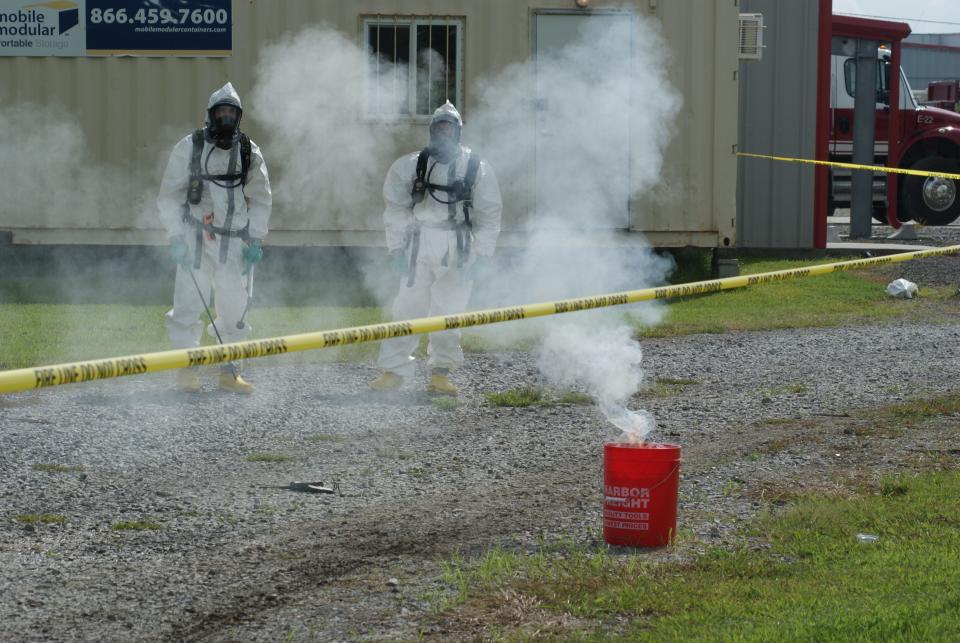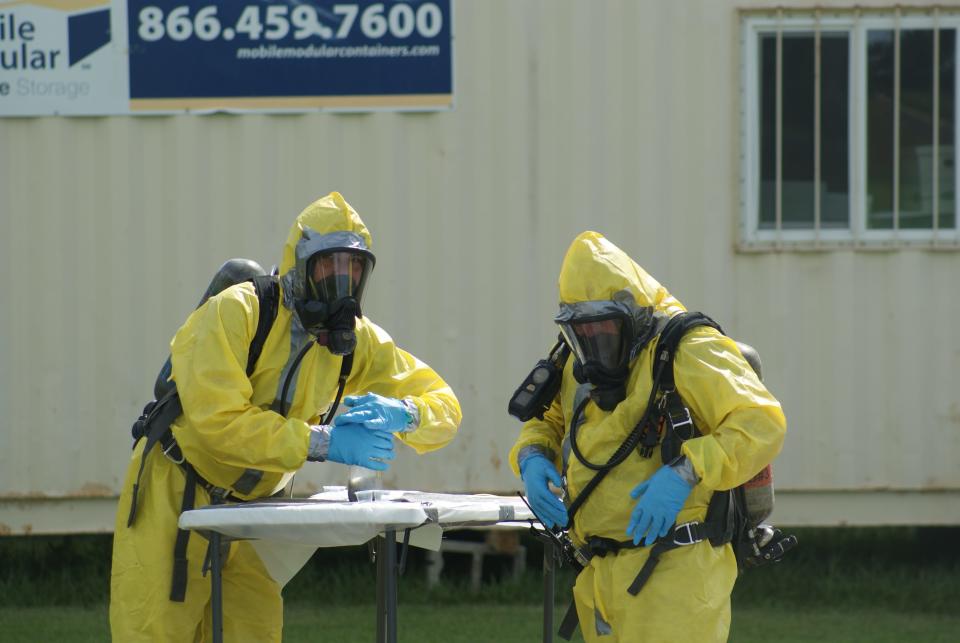South Lafourche firefighters learned how to cook meth this week. Here's why.
South Lafourche firefighter Grady Fagan entered a small storage unit Friday and found a meth lab set up inside.
It was part of an exercise that trained about two dozen firefighters how to handle and dispose of the hazardous materials without inhaling toxic chemicals or causing an explosion.
Fagan's role was to dispose of the lithium and sodium, both highly flammable metals.
Asked how he was doing as he removed his hazmat suit at the end of the session, Fagan responsed, "nervous as ****."
Fagan, 30, of Larose, and fellow firefighter Alex Pierce, 27, of Cut Off, found batteries inside that had been cut open to expose the lithium, which can combust from the humidity in the air. Fagan used tongs to pick up the lithium and drop it into a bucket of water. The bucket burst into flames.

The two reentered the unit, came out with the sodium and disposed of it in the same manner. The water burst into the sky, about the height of a one-story building.
Afterward, the men removed a bottle that was in the process of cooking meth. Two other firefighters, clad in hazmat suits, arrived to finish cooking the meth while the other two decontaminated. Finishing the process is crucial to relieving the pressure and avoiding an explosion. It involved "burping," or releasing the built-up air, similar to what you'd do with a shaken soda bottle.
If this is too dangerous, the bottle would be thrown in a metal drum and burned.
Fagan and Pierce were sprayed and cleaned off by other firefighters waiting with a fire hose.
Chief Devin Dedon said 26 firefighters from his Fire District 3 went through the weeklong course, held outside the Golden Meadow fire station. It was led by Jake Kelton, owner of Merit, a company that provides similar training across the country. The Lafourche Sheriff's Office and parish Office of Emergency Preparedness also participated.
After the storm: Several fire stations still down since Hurricane Ida. In one case, response times doubled.
Battling blaze: 60 firefighters work to bring Schriever blaze under control. No injuries reported.
Firefighters are sometimes called in after police raid a meth lab to help safely remove the materials and substances left behind.
Learning the process of cooking meth is important because if the raid occurs in the middle of the process, the cooking must be completed or an explosion can occur, Kelton said.
"When that ammonia is produced, it exceeds the threshold of the bottle and eventually it is going to fail, and when it does, you not only have the solvent being pushed out, ... when you push it out as a vapor and it catches fire, you have the boom," he said. "The lithium catches fire and it burns at 2,200 degrees Fahrenheit, which means all these guys' suits, it'll burn right through. It would burn right through your bone. It burns just like white phosphorus."

Meth lab raids are less common than in the past in Terrebonne and Lafourche. Both Kelton and Sgt. Adam Dufrene of the Lafourche Parish Sheriff's Office's Narcotics Division, said the illegal drug has become so cheap to purchase from cartels in Mexico that dealers just buy the meth and sell it at a higher price on the street.
Dufrene said the training is still invaluable because it is applicable to any lab raid his department encounters. The method for cleaning up is the same.
"He does a good job of demystifying the lethal part of it," Dufrene said. "This transfers over. ... If we were to go into a location and see a lot of fentanyl, in order to safely process it, we would do the same thing as what you see here."
This article originally appeared on Daily Comet: Firefighters learn to clean up a meth lab without causing an explosion

